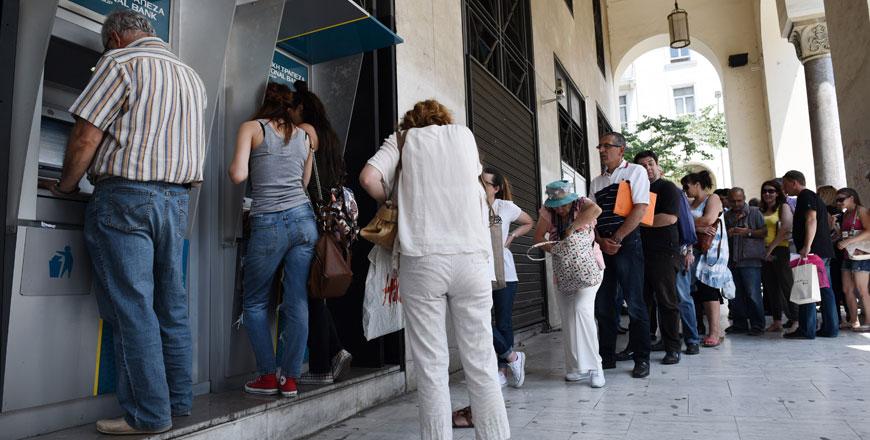You are here
Banks reopen, taxes rise as Greece pays billions to creditors
By AFP - Jul 20,2015 - Last updated at Jul 20,2015
ATHENS – Greece's government hiked taxes and began paying billions of euros to its creditors on Monday, as banks reopened just days after the debt-laden country reached a reforms-for-cash deal with its European partners.
Greeks woke up to widespread tax rises — on everything from sugar and cocoa to condoms, taxis and funerals — as part of the tough reform package agreed last week in exchange for a three-year bailout of up to 86 billion euros ($93 billion), aimed at keeping Greece from crashing out of the eurozone.
The nation's banks were thronged with customers after a three-week shutdown estimated to have cost the economy 3 billion euros. The banks were ordered to close on June 29 to prevent mass cash withdrawals that could have caused the financial system to collapse.
Banks are continuing to offer only limited services — with a ban on most transfers to foreign banks among the capital control measures still in place — but a daily cash withdrawal limit of 60 euros ($65) has been relaxed.
Bank tellers were dealing with a hectic stream of customers, many expressing frustration over continuing restrictions on financial services.
"I came today to collect my pension but unfortunately I could only get a small per centage of it," said Spyros Papasotiriou as he left his bank in the northern Athens suburb of Neo Psychiko. "It's a big hassle."
The International Monetary Fund (IMF) meanwhile confirmed that Greece is no longer in default on its loans after remitting about 2 billion euros to make up for missed loan repayments.
The payment was made possible by a 7.16 billion euro emergency bridge funding granted to Greece on Friday by the EU, so it could pay the IMF, as well as an additional 4.2 billion euros due to the European Central Bank on Monday.
Value-added tax (VAT) has gone up from 13 per cent to 23 per cent on a wide range of goods and services, although the tax on medicines, books and newspapers eased from 6.5 per cent to 6 per cent.
Tryphon Alexiadis, the new finance vice minister in charge of tax, vowed that "not a single euro from the tax rise will escape state coffers", adding that "a wave of inspections will be launched" to prevent tax evasion in a country where the problem is notoriously rife.
Along with the tax hikes, the Greek government — led by the radical-left Syriza party that came to power in January promising to end austerity — is also set to overhaul its ailing pension system as part of the reforms deal and launch privatisations it had previously opposed.
'Crash test'
Louka Katseli, the head of Greece's bank association, said some 40 billion euros have been withdrawn from Greek banks since December by customers anxious over the safety of their deposits, seriously damaging the banks' ability to function normally.
She urged people to bring their savings back to the banks to support the crisis-hit financial system.
"If we take out the money from our safes and our houses — where, in any case, it isn't safe — and we deposit it in the banks, we will reinforce liquidity," she told the Mega TV channel.
Greeks are now able to withdraw a maximum of 300 euros at once until Friday, when a new weekly limit of 420 euros takes effect.
They can also use their credit cards for foreign purchases again and certain exceptions to the capital controls have been introduced to help Greeks who are studying or undergoing medical treatment abroad.
But most people remain unable to take out large sums, transfer money to other countries or open new bank accounts.
The capital controls are taking a heavy toll on Greek businesses, with 23 per cent of firms saying they are seeking to move their headquarters abroad to improve stability and cash-flow, according to a survey released Monday by non-profit group Endeavour Greece.
The austerity package caused a mutiny among lawmakers of Prime Minister Alexis Tsipras's ruling Syriza party — forcing him to carry out a limited cabinet reshuffle on Friday — and he faces a fresh challenge on Wednesday, when parliament must approve a second wave of reforms tied to the rescue package.
Pro-government newspaper Avgi on Sunday said the vote would be a "crash test" that could even result in Tsipras's resignation.
"If there are new losses, in whatever form, [Tsipras] will hand back his mandate," the daily said.
Related Articles
ATHENS — Greece's government on Tuesday submitted tough bailout terms demanded by eurozone creditors to parliament, as Prime Minister Alexis
ATHENS — Greek Prime Minister Alexis Tsipras announced his resignation and called for snap elections on Thursday, as he went on the offensiv
ATHENS — Stunned Greeks faced shuttered banks, long supermarket lines and overwhelming uncertainty on Monday as a breakdown in talks with in

















